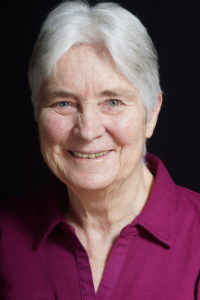 Sister Patricia Ryan
Sister Patricia Ryan
Current ministry Location – Peru
Patricia Ryan was born September 12, 1946 in Jamaica, NY to Irene T. (La Donnick) Ryan and Walter G. Ryan. She had 2 brothers: Robert and Douglas. Patricia (Pat) graduated from Queen of the Rosary High School in Amityville, NY in 1964.
Patricia (Pat) Ryan entered Maryknoll September 2, 1965 at Topsfield, MA from St. Bernard’s parish, Levittown, N Y. She made her First Profession of Vows on June 24, 1968 at Maryknoll, NY and her Final Profession of Vows May 18, 1975 in Peru. Sister Pat received a Bachelor of Arts in Community Service from Mary Rogers College, Maryknoll, NY in 1972 and was assigned to Peru that same year.
Sister Pat studied Spanish at Barranco in Lima, Peru from November 1971-February 1972 and began ministry in June of 1972 in the Prelature of Juli among the Aymara people. By 1973, Sister Pat was in full time Adult Education ministry at the Rural Education Institute engaged in rebuilding the Aymara people’s low self-image.
To enter more fully into the lives of the indigenous people of the Altiplano, Sister Pat studied the Aymara Language in Cochabamba, Bolivia in 1976. She worked assiduously with the Aymara women who then returned to their local villages and conducted similar courses for other women introduced by Sister Pat. These ministries of empowering led Sister Pat to accompany the Aymara people and their local communities to search and implement constructive and non-violent alternatives to the situation of extreme poverty, violence and environmental destruction.
With dedication in her work, uplifting the people to reclaim their human dignity and achieving more education, Sister Pat was made Coordinator of the Institute of Rural Education from 1975–1982. In 1982 Sister Pat joined the Pastoral Team of Mocachi in Camacani, Peru of the Juli Prelature. Sister Pat was elected to the Executive Board on the Committee for the Defense of Human Rights for the Dept. of Puno in December 1984; served as Editor of the Bulletin “ARUSA” in May 1978; was a member of the Executive Committee of IPA (Andean Pastoral Institute) Southern Andes Region in December 1986, made Vicar of Solidarity, of the Juli Prelature in August 1988 and was a member of the Mocachi Pastoral Team from 1982-1991. Becoming a member of these different committees on the national, South Andean and Puno levels Sister Pat was a strong advocate of justice and peace and worked relentlessly on the defense of human rights and of the earth.
Sister Pat gave workshops to police officers so that they, too would not only know their rights but also respect and protect the rights of the Andean peoples. In 1988, Sister Pat joined her efforts with a team of committed Christians in the Office of Human Rights and Care of the Earth.
Sister Pat was elected Vice-President of the Maryknoll Sisters Congregation in 1997. At the end of her term in 2002, Sister Pat returned to the Altiplano of Peru to continue the ministries in which she was already involved. On December 10, 2008, Sister Pat was among the Maryknollers of the Juli Prelature of Puno to receive the National Award of Human Rights in Peru in recognition of the work Maryknoll had done since 1943 among the indigenous peoples of the Altiplano.
Sadly, Maryknoll was banished from the Prelature in 2008 by the new bishop of Juli, Jose Maria Ortega Trinidad, and a member of Opus Dei. Maryknollers continued to work in the Diocese of Puno, among the Aymaras. Sister Pat continued to help indigenous peoples in Peru publicize contamination of their water caused by the toxic waste affecting the pristine Toco Toco River that meets the dead Condoraque River in the Altiplano. The livestock were dying and no one knew exactly why. It wasn’t the cold or the altitude; alpaca is native to the Andes and sheep adapt well, even at 15, 000 ft. above sea level. The herders from Condoraque suspected their losses had something to do with the 30-year-old tungsten mine a few miles upriver. Sister Pat found herself in charge of the operation and together with the Human Rights Team, Trinidad Carlos and Cristobal Yugra, who are both human rights lawyers along with Pedro Camacho, an agronomist and educator decided to go public after hearing testimonies from villagers and stratagems from mine representatives.
In August 2009, the Human Rights Team brought the case to the Maryknoll Office for Global Concerns in Washington, D.C. which handed it over to the UN. In May 2010 Condoraque’s concerns were presented to the United Nations in NY. “It is an ongoing struggle to achieve the resolution to these concerns,” said Sister Pat.

